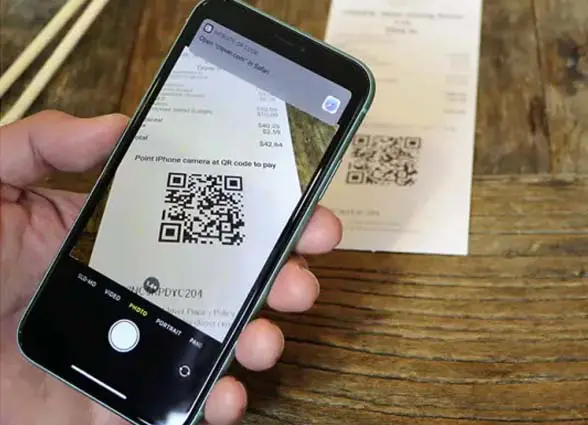Las Vegas restaurant Makers & Finders is the first to use a new service that lets diners scan a QR code on their printed bill to pay for their meal with Apple Pay... More
- Apple Pay users in the US to get buy now pay later option with iOS 16
- BIS reports on CBDCs in emerging markets
- Moroccan bank launches biometric payment card
- US digital bank introduces contactless payments rings
- Riksbank completes digital currency payments pilot
Apple Pay now accounts for 5% of global card transactions
Payments made via Apple Pay now account for around 5% of global card transactions, according to research firm Bernstein — and are set to represent 10% of all card transactions by 2025... More
Contactless payments set to triple to US$6tn by 2024

Global contactless transaction values will reach nearly US$6tn in 2024, up from US$2tn today, Juniper Research forecasts. More
Google to revamp its payments products
“We had a tremendously successful launch in India from which we learnt a lot of features, and we are bringing that and we are revamping our payments products globally,” Alphabet CEO Sundar Pichai has revealed... More
India to relax mobile wallet KYC rules
‘Low KYC’ norm to help mobile wallets retain their customers — Economic Times — “In a move set to bring relief to scores of mobile wallet firms such as Paytm, PhonePe, Amazon Pay and their several million users, the Reserve Bank of India (RBI) will allow wallet service providers to continue operating their millions of non-compliant know-your-customer (KYC) accounts which earlier faced cancellation… An estimated over 200m mobile wallets ran the risk of being cancelled by the regulators, once the deadline to upgrade their non-compliant accounts to ‘full KYC’ accounts expires on February 29.”
Keep up to date: Get NFCW's headlines by email every Wednesday
Federal Reserve sets out its digital currency position
The digitalization of payments and currency: Some issues for consideration — The Federal Reserve — “Given the dollar’s important role, it is essential that we remain on the frontier of research and policy development regarding CBDC [Central Bank Digital Currency]. Like other central banks, we are conducting research and experimentation related to distributed ledger technologies and their potential use case for digital currencies, including the potential for a CBDC. We are collaborating with other central banks as we advance our understanding of central bank digital currencies.”
7-Eleven pilots cashierless store at US headquarters

7-Eleven is piloting a cashierless store concept at its US headquarters that uses technology developed in-house to let employees check in to the 700sqft store, shop and then exit — without needing to visit a physical checkout. More
One in fourteen UK consumers no longer carry a physical wallet
One in 14 people ‘no longer carry a wallet’ — Yahoo Finance — “One in 14 people say they no longer carry a wallet, a survey has found. Some 7% no longer take a wallet out and about with them, while a fifth (20%) said that if they were to look in their wallet it would not contain any cash.”
Israeli banks balk at Apple Pay fees
Turbulent entry into the payments market: Apple Pay requires high commission in Israel — Calcalist (translation) — “Apple representatives have begun a round of meetings with banks and credit companies to formulate agreements to begin Apple Pay’s operations in the country… Some players were surprised to find that Apple requires a fairly high fee estimated at 0.15% to 0.25% of any transaction made through Apple Pay… ‘It is disproportionate, and constitutes an exploitation of its status and power,’ says a source close to the talks between the parties.”
Visa to introduce variable interchange rates in the US
Visa is planning the biggest changes to swipe fees in a decade — Bloomberg — “The company’s interchange rates — fees charged every time a consumer uses a card — will go up or down depending on the merchant and the way a consumer pays for their purchases, according to a document Visa sent to banks that outlines the changes. Higher rates are looming for transactions on e-commerce sites, while retailers in certain services categories, such as real estate and education, will see fees decline.”
Royal Australian Mint to phase out silver coins?
Royal Australian Mint expects lowly silver coins to be phased out amid rise of contactless payments — ABC Radio Melbourne — “Royal Australian Mint chief executive Ross MacDiarmid said demand for coinage had dropped by about 55% in the last five years, and most of that had been for silver coins… Rising inflation, coupled with the growth of online and contactless payments, are rendering the lowly silvers obsolete… Much like the old 1 and 2c coins, phased out in the 1990s, Mr MacDiarmid expected the mint to eventually stop producing 5 and 10c coins.”
Worldline to acquire Ingenico for €7.8bn
Worldline to acquire Ingenico — Worldline — “This transaction would combine two premier companies to create the world’s number four player in payment services with circa 20,000 employees in approximately 50 countries… Upon closing, the new combined group would offer best-in-class payment services to nearly 1m merchants and 1,200 financial institutions.”
Keep up to date: Get NFCW's headlines by email every Wednesday
Visa CEO shares contactless, tokenization, transit and secure remote commerce adoption data
Data on the latest adoption rates for contactless transactions, tokenization, transit payments and secure remote commerce has been made available by Visa CEO Al Kelly — along with details of the revenue model to be used by Plaid, which Visa is to acquire for $5.3bn... More
IBM patents self-aware cryptocurrency token
IBM awarded patent for ‘self-aware token’ — Coindesk — “The patent outlines a ledger-based payments system that could make it easier for individual users, businesses and governments to track and trace transactions made using a cryptocurrency. Dubbed the ‘self-aware token’, it is designed to record all transaction data when not being used on a payments platform IBM patented in 2012. When the token rejoins the platform ecosystem at a later stage, it automatically uploads data from any ‘off-line transactions’.”
Cambodia to launch blockchain-based national QR payments platform
NBC’s digital payments to go live in next few months — The Phnom Penh Post — “The National Bank of Cambodia (NBC) will launch a blockchain-based, peer-to-peer payment and money transfer platform in the next few months… Bakong, essentially a quasi-form of a central bank digital currency (CBDC), was launched on a trial basis in July and will be operational within the present fiscal quarter… Bakong will help set a national standard for QR code usage, which will be integrated with Asean equivalents.”
Mastercard rolls out Cash Pick-Up service that lets anyone send cash to ATMs
Mastercard wants to give you fast access to cash — using only your cell phone — CNBC — “Consumers can withdraw money sent by friends and family, get cash in emergency situations (in the event of a lost bank card, for example), and redeem rebates or other cash rewards that corporations have historically sent via mail… Users receive a text message with an order amount, secret code and link showing the nearest ATM from which they can withdraw money — up to US$500 per order and $3,000 a day.”
Payments Canada adds support for delayed debit card authorization
New Payments Canada rule enables wider use of digital debit payments — Payments Canada — “With delayed authorization, a merchant can now opt to provide a service before a payment transaction is authorized. In the example of a transit operator, this will support a passenger being able to pay and ride without having to wait for payments authorization. Beyond transit, Rule E5 is designed to enable other possible use cases, for example payment at parking meters, payment for on-board purchases (airline/train/ferry) and payment for vending machine purchases.”
Google to sunset Payment Request API
Rethinking Payment Request for iOS Chrome — Google — “The best way to enable more seamless and secure payments on the web is to enable an interoperable ecosystem, where digital wallets can bring their best experience to the web. This means shifting focus to the Payment Handler API, which is an emerging W3C standard that allows third party payment handlers, which can be either native mobile apps or progressive web apps, to integrate with the browser to handle Payment Requests… This shift in focus means that we will eventually sunset Chrome’s built-in ‘basic-card’ payment handler.”
Apple Pay revenue and transactions ‘more than double’ in the year

Apple Pay revenue and transactions have “more than doubled year-over-year with the run rate exceeding 15bn transactions a year,” Apple CEO Tim Cook has revealed. More
UK consumers warming to face biometrics
A survey has found that while half of Brits are happy to unlock their phones with their faces, only a third trust the technology to authorise a payment... More

